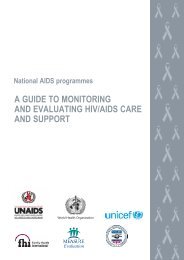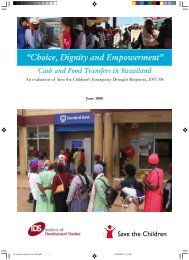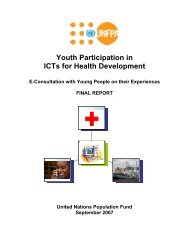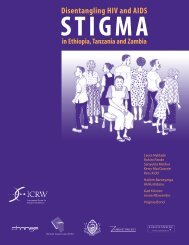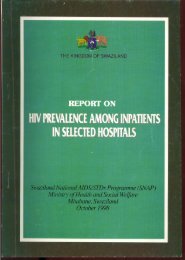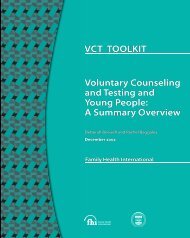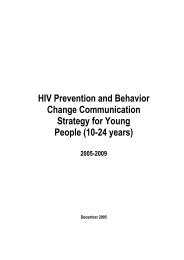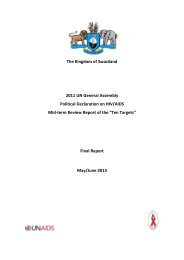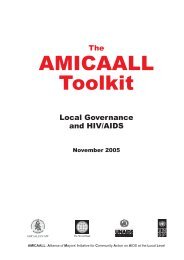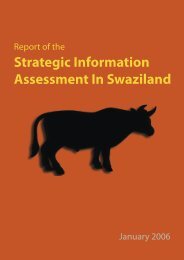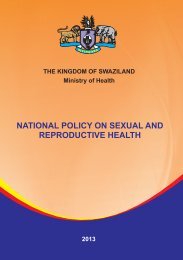HIV/AIDS+WORK Swaziland
HIV/AIDS, work and development - (NERCHA), the Info Centre
HIV/AIDS, work and development - (NERCHA), the Info Centre
- No tags were found...
You also want an ePaper? Increase the reach of your titles
YUMPU automatically turns print PDFs into web optimized ePapers that Google loves.
D. RecommendationsThe commitments outlined in this paperare signs that the country is ready to tackle the<strong>HIV</strong>/AIDS epidemic. However, the governmentmust also commit its resources to proactive<strong>HIV</strong>/STI prevention and control. In addition togovernment efforts, community participationat all levels is essential for effective <strong>HIV</strong>/AIDScare, prevention, and support activities. In thepresence of a coherent <strong>HIV</strong>/AIDS policy, andmultisectoral involvement, <strong>Swaziland</strong> will beable to fight the <strong>HIV</strong>/AIDS epidemic.i GeneralGiven the threat posed by AIDS, a nationalresponse should be mainstreamed across allmajor sectors, rather than being consideredpurely as a health issue to be dealt with by theMinistry of Health.• A multisectoral reaction should be fullyincorporated into the planning process,targeting ways and means of reducingtransmission and morbidity and mitigatingthe negative impact of AIDS. Althoughorganizations such as UNDP and theWorld Bank have commissioned situationanalyses in certain geographical regions,few comprehensive sectoral impactassessments have been done.• Human resource development efforts needto aim at replacing skills and ensuring anadequate pool of skills at any given point intime.• On a macroeconomic level, the generationof employment through enterprisedevelopment and investment promotionmust be made a priority in order to maintaina level of investment proportional to theannual GDP growth.and public awareness programmes leadingto changes in sexual behaviour. Suchindicators will be useful in formulatingpreventive messages and public-awarenessstrategies in the future. It would also beused for identifying population groups andassessing over time the effectiveness ofthese programmes.• ILO could play an important role incollaborating with the trade unions insensitizing staff on issues related to<strong>HIV</strong>/AIDS. This would include trainingand enhancing the capacities of suchstaff in terms of tackling <strong>HIV</strong>/AIDS in theworkplace, including such issues in tradeunion activities, and designing awarenessraisingprogrammes.• As mentioned in Section B, some progressivepublic and private sector employers haveadopted comprehensive prevention andcare programmes for their staff. The role ofthe ILO vis-à-vis employers is to help ensurethat such policies permeate all firms andnot only a select group of large corporations,so that the benefits reach the grass-rootslevel. This should also extend to the publicsector and the informal economy.• In creating a social safety net, it is importantto develop a comprehensive ‘<strong>HIV</strong>/AIDS inthe Workplace’ programme, for which theILO Code of Practice on <strong>HIV</strong>/AIDS and theworld of work may be used as a guide. Thefindings of research carried out on labourlegislation provisions relating to <strong>HIV</strong>/AIDSrelateddiscrimination can be a usefulstarting point.18<strong>Swaziland</strong>: <strong>HIV</strong>/AIDS work and development• There is a need for research that generatesestimates of losses, the gender and agedistributions of human capital losses, themain skill levels affected, and identificationof these losses by region and sector. Studieswould also need to take into account anyprevious efforts by the public services inthese regions and their capacity to alleviatethe AIDS-related labour resource problems.• There has been very little research done onthe behavioural aspect of <strong>HIV</strong>/AIDS as it is asensitive issue and the impact of education



